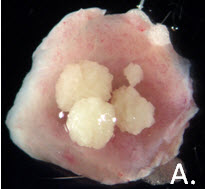Etiology: Females greater than 3 years of age may develop cystitis (several different bacteria have been implicated) and form cystic calculi [2]. Urinary calculi can also occur in aged boars when congealed ejaculum forms proteinaceous urethral obstructions.
Incidence: Uroliths (most commonly calcium carbonate) occur commonly.
Clinical Signs: Anorexia, hematuria, dysuria and hunched posture may be noted.
Pathology: Urinary bladder mucosal hemorrhage or congestion and calculi which adhere to the urinary bladder wall may be appreciated grossly (A.).
Diagnosis: Diagnosis is made based on clinical signs and radiography.

2. Hawkins, M.G., et al., Composition and characteristics of urinary calculi from guinea pigs. J Am Vet Med Assoc, 2009. 234(2): p. 214-20.